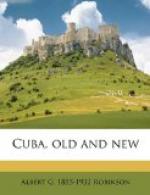A fair presentation of political conditions in Cuba is exceedingly difficult, or rather it is difficult so to present them that they will be fairly understood. I have always regarded the establishment of the Cuban Republic in 1902 as premature, though probably unavoidable. A few years of experience with an autonomous government under American auspices, civil and not military, as a prologue to full independence, might have been the wiser course, but such a plan seemed impossible. The Cubans in the field had forced from Spain concessions that were satisfactory to many. Whether they could have forced more than that, without the physical assistance given by the United States, is perhaps doubtful. The matter might have been determined by the grant of the belligerent rights for which they repeatedly appealed to the United States. At no time in the entire experience did they ask for intervention. That came as the result of a combination of American wrath and American sympathy, and more in the interest of the United States than because of concern for the Cubans. But, their victory won and Spain expelled, the triumphant Cubans naturally desired immediate enjoyment of the fruits of victory. They desired to exercise the independence for which they had fought. Many protests and not a few threats of trouble attended even the brief period of American occupation. There was, moreover, an acute political issue in the United States. The peace and order declared as the purpose of American intervention had been established. The amendment to the Joint Resolution of April 20, 1898, disclaimed “any disposition or intention to exercise sovereignty, jurisdiction, or control over said Island except for the pacification thereof,” etc. The island was pacified. The amendment asserted,




